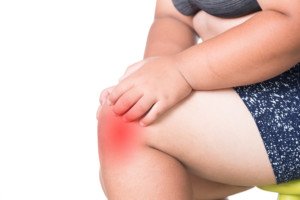If you’re obese with knee pain, it’s crucial that you lose weight if you’re wondering if fat loss can make a total knee replacement no longer necessary.
Whether you’re morbidly obese, moderately obese or overweight – if you suffer from so much knee pain that you’ve started to wonder about joint replacement – you’ll first want to look into losing the weight.
Perhaps you’ve jumped on that bandwagon that insists an obese body can be as healthy as a normal weight body.
Maybe you’ve joined the ranks of “body positive” enthusiasts who insist that we can’t tell a person’s health by their size.
But have your knees been killing you lately?
Nobody wants to go under the knife. So maybe you’re wondering if you can outright prevent a total knee replacement if you shed a hundred or more pounds.
Nothing Positive About Knee Pain
“While losing weight cannot be a substitute for joint replacement surgery, it can have a profound effect on diminishing the pain, and perhaps even postponing or eliminating the need for the surgery,” says Barbara Bergin, MD, board certified orthopedic surgeon at and co-founder of Texas Orthopedics, Sports & Rehabilitation Associates.
“Morbid obesity can age a knee by 20 years! So, let’s say you’re genetically scheduled to get knee arthritis when you’re 65 (like maybe your mom or dad, or both had knee replacement surgery when they were 65).
“Then [if you’re morbidly obese], you might begin to have symptoms of knee arthritis when you’re 45, or even sooner!

Michael Coghlan/Adelaide, Australia
“I’m seeing knee arthritis in morbidly obese 35-year-olds! Weight loss would have a significant preventive effect in these individuals.
“Once you have arthritis, it is a progressive disorder and will get worse with time, no matter how much you weigh.
“But it will occur faster if you are overweight or obese.”
Just because you have osteoarthritis of the knee joint doesn’t mean you’ll eventually need surgery.
In other words, you may not be able to prevent the eventual wearing down of the cartilage, but if you’re at a healthy body weight, you may live to 90 without your knees becoming painful enough to necessitate a replacement.
This would not be the case with a morbidly obese individual. In their case, the need for a total knee replacement is inevitable.
Dr. Bergin explains, “Losing weight takes pressure off the weight-bearing joints. Additionally, it changes the mechanics of the lower extremities.
“People with large thighs walk with their legs spread apart. This alters the natural position of the joint and puts abnormal strains on the cartilage. Losing weight allows the legs to move in a more normal way.

Shutterstock/Hannamariah
“Postponement of knee replacement is the name of the game.
“Having knee replacement at a young age almost guarantees that you will end up requiring a revision of that knee replacement.
“Revisions are salvage operations, meaning, they are more complicated, more likely to get infected and less likely to have a good result, than the original knee replacement.
“I’ve had a few morbidly obese patients lose weight and find they no longer needed to have the knee replacement.
“Additionally, weight loss makes a person a better candidate for knee replacement surgery (when it is finally needed).
“Less likely to get an infection, more likely to have a good long-term outcome and for the replacement to last longer.”
• If you suffer from knee pain, see your doctor.
• If you’re overweight, lose weight.
• Body positivity is protecting your knees from the combination of gravity and excess fat.

Dr. Bergin is a general orthopedist, surgically and conservatively treating all manner of bone and joint conditions. She enjoys educating patients so they can emerge stronger than they were before their orthopedic injury or surgery.
 Lorra Garrick has been covering medical, fitness and cybersecurity topics for many years, having written thousands of articles for print magazines and websites, including as a ghostwriter. She’s also a former ACE-certified personal trainer.
Lorra Garrick has been covering medical, fitness and cybersecurity topics for many years, having written thousands of articles for print magazines and websites, including as a ghostwriter. She’s also a former ACE-certified personal trainer.
.



























